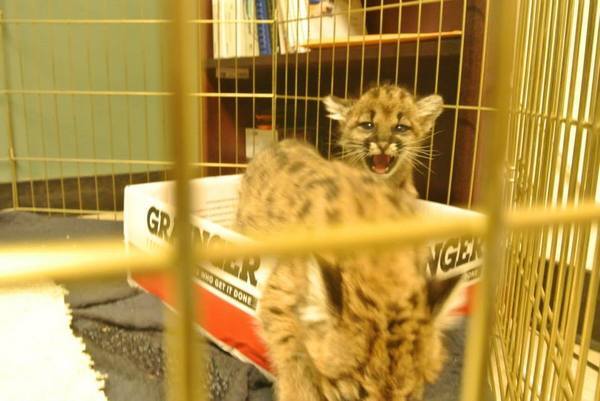Good News: Mountain Lion Cubs Rescued; Bad News: Future Uncertain

The California Department of Fish and Wildlife (CDFW) is seeing to a trio of abandoned mountain lion cubs that residents of a tiny unincorporated community in Siskiyou County noticed walking, shivering, and unhappy, along a riverbank.
According to a note on the CDFW Facebook page, Callahan residents noticed the three tiny cubs walking along Scott River without adult supervision. CDFW tracked the reports for a day without springing into action, as many people who report apparently abandoned baby animals turn out to have missed Mama lurking in the nearby trees.
But when one neighbor reported a day after the first sightings that the babies were shivering and meowing, clearly upset and uncomfortable, CDFW took them into protective custody. The three -- two brothers and a sister -- are now safe and warm in a CDFW clinic, chowing down on a mixture of kitten formula and meat provided by the State of California.
The CDFW posted a number of photos of the three baby pumas, some of which we'll republish below because, after all, baby pumas!




The CDFW's description of the photo immediately above: "After each meal, the cubs are wiped down head to tail (and underneath) by staff to mimic what their mother would do." That's a discreet way of saying that the kittens need a little help from mom, or a surrogate, to keep their gastrointestinal systems operating properly from one end to the other. Constipated cubs are no fun for anyone.
Not that fun is the point. (No, really, it isn't.) As CDFW reminds visitors to its Facebook page, even cuddly-looking mountain lion cubs are wild animals, a sentiment with which this cub seems to agree:

Not that this is a perfectly happy story. According to CDFW's Janice Mackey, the three rescued baby mountain lions won't be returned to the wild, but will live out the rest of their lives in a captiviity. "Having wild pumas that are habituated to humans causes trouble," Mackey told ReWild, "and we've had to handle these cubs to take care of them. When they're ready, they'll be sent to a certified facility. But they won't be released into the wild."
As recently as this year, a puma cub in the Bay Area found itself in a similar situation: found in San Jose in March apparently orphaned and very ill, the cub was shipped to the Arizona-Sonora Desert Museum in Tucson, Arizona after it was nursed back to health.
CDFW currently has no program to rehabilitate and release mountain lions in California. The recently-passed SB 132, which gives CDFW greater latitude in working with mountain lions that come into contact with people but seem to pose no threat, may change that. The law says that CDFW must use non-lethal methods whenever possible to deal with older pumas that come into contact with humans, and allows CDFW to establish partnerships with other agencies and non-profits to make that happen.
But there's a chance that as the law is implemented, changes will be made to the state's regulations for relocating mountain lions that will allow rehabilitation as well. Before the law passed, a working group within CDFW was drafting new guidelines for rehab and release of orphaned mountain lion cubs, as well as injured animals of any age. That draft notes that CDFW has no legal authority to rehabilitate pumas, but SB 132 may well be interpreted to grant that authority.
Just one state, Florida, is actively rehabbing puma kittens and releasing them into the wild. The Florida "panther" -- a subspecies of mountain lion -- is endangered, with fewer than 200 still living in the wild, giving Florida a good reason to release orphans once they can fend for themselves. It's very likely that California wildlife managers can learn from Florida to keep future cubs from imprinting on humans.
In the meantime, it's unlikely that California's rules will be rewritten in time to get these orphaned pumas back into the wild, so the three face a lifetime of captivity. Still, that's probably better than freezing to death. Good luck, kittens.


